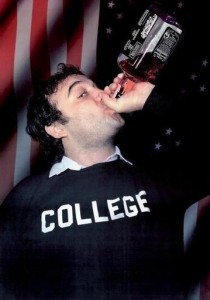Article Contributed by Crystal Karges, MS, RDN, IBCLC for Addiction Hope
 Making the decision to attend college is something that requires months, if not years, of planning and preparation. Students enter this phase of their life with great anticipation for the future. With the promise of potential on the horizon, the college years often greet students with hopeful expectancy. While these years can be defined by an eagerness for change and newness, this can also be a time when different challenges arise.
Making the decision to attend college is something that requires months, if not years, of planning and preparation. Students enter this phase of their life with great anticipation for the future. With the promise of potential on the horizon, the college years often greet students with hopeful expectancy. While these years can be defined by an eagerness for change and newness, this can also be a time when different challenges arise.
As students strive to achieve in their college careers and work towards accomplishing academic and educational goals, there is an increased need to learn balance in their social lives as well.
College Campuses Create New Social Lives
Most students will approach their college years with expectations for a new social life as well, including making new friends, participating in new activities and recreational events, and finding acceptance in various social circles. During this critical time for a college student, they will undoubtedly face decisions regarding their social life that can impact their careers and futures as well.
For example, students will have to make a decision about how they will handle alcohol, which will likely be encountered during their time in college. According to the National Institute on Alcohol Abuse and Alcoholism, essentially all college students will experience the effects of college drinking, whether they choose to drink or not [1].
Alcohol Abuse on Campus
Statistics from research show the prevalence of college drinking, revealing that about four out of five college students drink alcohol, with about half of the students who drink consuming alcohol through binge drinking [1]. Sadly, the consequences of abusive college drinking are devastating, impacting a student’s life in multiple ways. It is estimated that almost 2,000 college students between the ages of 18 and 24 die from alcohol-related unintentional injuries, including motor vehicle crashes [2].
Alcohol abuse during college can also result in unintentionally injury while under the influence of alcohol, physical or sexual assault, unsafe sex practices, academic problems, alcohol dependency, drunk driving, and increased risk for physical and mental health problems.
Factors That Affect Student Drinking
Part of the reason college students are more vulnerable to alcohol use is the perceived notion that college is an acceptable time to experiment and try out alcohol and drugs. Many students approach this time of their life with the idea that “partying” and consuming drugs and alcohol among peers is a “rite of passage” that defines the college experience.
The college environment, which typically includes greater freedom, less structured schedules, limited interfacing with authority figures, and greater accessibility to alcohol, can prime the stage for students who view drinking as a ritualistic part of their higher-education experience. Research has also shown that students are more vulnerable to consuming alcohol during their first six weeks of freshman year, as this time is prone to social pressures in combination with student expectations [1].
The reality of the situation is that students will likely be exposed to alcohol, substance abuse, and partying during their time in college, in one form or another. As underage and abusive college drinking is becoming a significant public health concern, and with so much at stake in the lives of students across the nation, what is the best way to approach these encounters and social interactions?
Different Ways to Approach Social Intereactions
The following are some suggestions to help a student approach the idea of “partying” or experimenting with drinking on college campuses:
- Talk About it: If you have a loved one who is headed to college, be sure to have a conversation about alcohol use and its adverse consequences with your student. Many parents and guardians often underestimate the influence they can have on their child’s life. However, research demonstrates that students who choose not to drink often do so because their parents took the time to discuss issues and concerns about alcohol use.
- Get Connected: As a college student, you may feel susceptible to peer or social pressures, especially in your first year at school. Find positive and support groups to become involved in or seek out a mentor or counselor. Many wellness programs on campus offer mentorship programs that can connect you to supportive peers during your transition.
- Focus on your Priorities: What are your goals that you hope to achieve while in college? Are the choices you are making on a daily basis ultimately supporting your goals and dreams? Remember that the pleasures sought from partying and drinking are temporary, and the effects of your decision will be lasting. Be sure to make choices that support your endeavors.
- Find a Balance: College is a time of tremendous opportunity. It may take trial and error, but learn to find an appropriate balance between academics and your social life. Choose social activities that encourage your growth as an individual to take advantage of your time at school.
Focusing on the positive aspects and opportunities of a college career can bring about an enriching experience, one that can develop without the harmful effects and consequences of drinking and partying.
Contributor: Crystal Karges, MS, RDN, IBCLC for Addiction Hope
References:
[1]: National Institute of Alcohol Abuse and Alcoholism, “College Drinking”, http://www.niaaa.nih.gov/alcohol-health/special-populations-co-occurring-disorders/college-drinking
[2]: Hingson, R.W.; et al. Magnitude of and trends in alcohol-related mortality and morbidity among U.S. college students ages 18-24, 1998-2005. Journal of Studies on Alcohol and Drugs Supplement 16:12-20, 2009.
